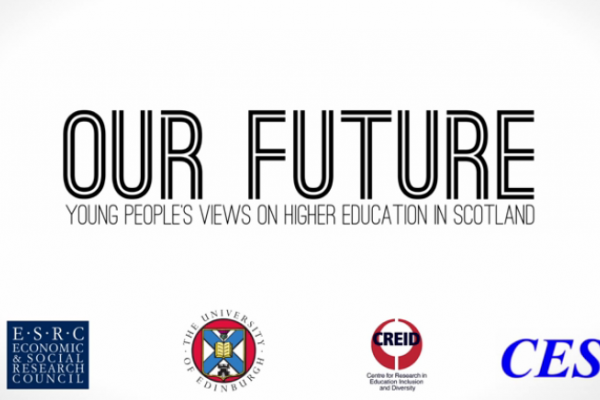by Sarah Minty, Research Fellow, Centre for Research in Education Inclusion and Diversity (CREID)
*There are still a few places left for our seminar: The future of higher education in Scotland and the UK, to be held at National Museum of Scotland in Edinburgh on 29 January. Speakers include Michael Russell, Cabinet Secretary for Education and Lifelong Learning, Scottish Government; Alistair Carmichael, Secretary of State for Scotland; and Sir Andrew Cubie, Chair of the Leadership Foundation for Higher Education, among others. Further information can be found on the CREID website. *
As we move closer to the referendum, higher education is becoming a particularly salient issue in the independence debate. The future of research funding, whether Scottish universities would maintain their high world ranking, and questions about the funding of tuition have all been under the spotlight recently.
It is apt then that last week we launched a short film which explores young people’s views on higher education in the context of independence. In amongst all the debate about policy and politics, it is easy to lose sight of the views of the end-users of higher education, many of whom will be voting for the first time. The film, Our Future: Young People’s Views on Higher Education in Scotland, forms part of our ESRC Research Fellowship project, "Higher Education in Scotland, the Devolution Settlement and the Referendum on Independence", and is focused on promoting the engagement of young people in the independence debate.
It includes interviews with young people aged 14 to 17 in nine schools and one college, in Edinburgh, Fife, Glasgow, West Lothian and the Western Isles. In total, we held discussions with 143 young people, and filmed interviews with 89 of these (though we weren’t able to include them all in the film). The topics covered include:
- participation in, and the benefits of, higher education;
- the funding of higher education;
- the movement of students between different UK countries;
- widening access to higher education; and
- issues relating to the referendum on independence and voting intentions.
To provide some context to young people’s views, the film also includes interviews with researchers from the University of Edinburgh; Sir Andrew Cubie, author of the Cubie Report in 1999 and Chair of the Leadership Foundation for Higher Education; Gordon Maloney, NUS Scotland President; and Louise Cameron, Vice Chair of the Scottish Youth Parliament. It is accompanied by a set of teaching materials which provide information and topics for discussion.
Whilst projects such as AQMEN’s Survey of Young Scots have investigated young people’s attitudes to the referendum and their voting intentions, we are interested in exploring the reasons behind young people’s views on Scottish independence and how it might affect the higher education sector. The majority of young people who took part in interviews for the film (80%) said they intended to go on to either university or college. While some raised concerns about the cost of going to university (despite ‘free’ tuition) and a potential lack of job opportunities in the future, most still concluded that going to university or college would be worth it in the long run due to the graduate premium and the social and personal development benefits. Most young people welcomed free tuition as a way of ensuring everyone has the same chance of going to university; however, some suggested that it would be fairer to provide more targeted support for those from low participation areas.
Our interviews also explored young people’s views on independence; a considerable number we spoke to were still undecided as to how they would vote. Like AQMeN’s recent Survey of Young Scots we found a desire for more unbiased information on the referendum, particularly that which is tailored specifically to young people. We also found some young people were turned off by perceived political point scoring, and distrusted information provided by the two campaigns. The refrain we frequently heard was “just tell us the consequences of voting either way”.
Our resources do not suggest or support a particular outcome of the referendum, and the team has taken a neutral position throughout the research process. We hope the film will provide a useful resource as a discussion stimulant for teachers of social studies subjects, particularly Modern Studies. However, the issues discussed in the materials are of relevance to all young people and may also be useful resources for teachers of PSE/ Guidance and Citizenship. How higher education is funded, who gains access to university, and where people study are all questions which will continue to be debated in the run up to the referendum, and beyond.
The film is available to view either in full (20 minutes) or in five shorter, individual sections. The full version of the film can be viewed on YouTube. Links to the film and electronic versions of the teaching materials can be accessed via our website, where you can also find further information on the research project.

